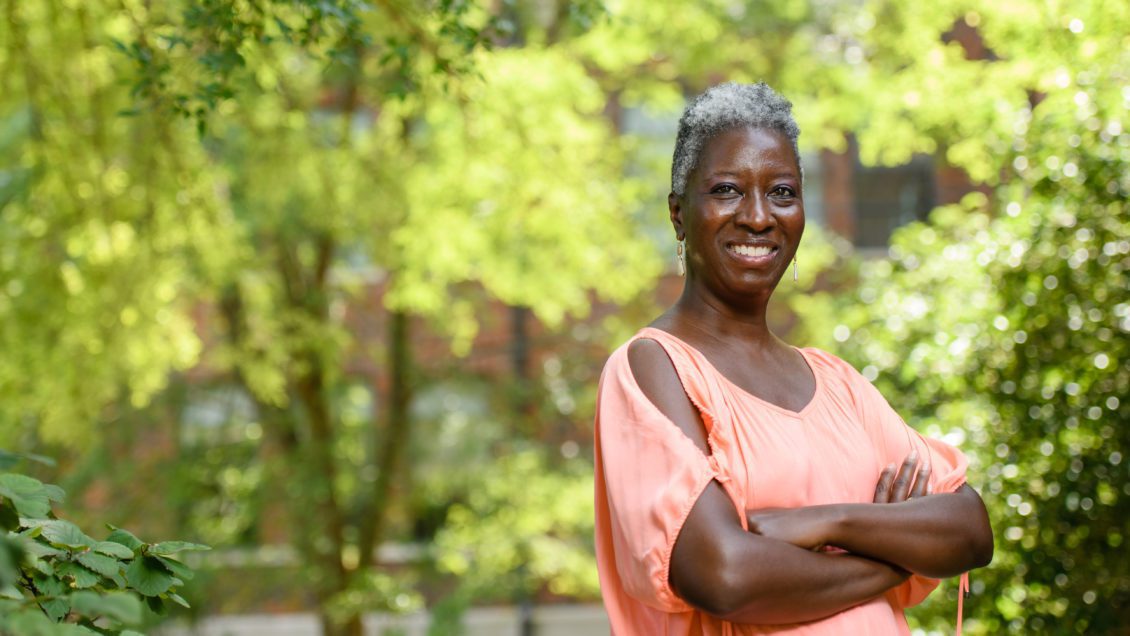L. Kaifa Roland has been appointed Director of the Pan African Studies program at Clemson University. Roland joins Clemson from the University of Colorado at Boulder, where she has been Associate Professor of Anthropology since 2006 and served as Chair of Women and Gender Studies since 2020.
Pan African Studies is an interdisciplinary degree program that explores the social, economic and political contributions that people of African descent have made to global society and examines diverse cultures around the world.
“Kaifa stood out from a remarkably strong field of candidates,” said James Burns, Associate Dean for Undergraduate and Graduate Studies in the College of Architecture, Arts and Humanities, who led the search committee. “She is a proven leader and accomplished scholar, but what really impressed the committee was her enthusiasm for working with students.”
“I am extremely excited to see what impact Dr. Roland will have on campus,” said Nicholas Vazsonyi, Dean of the College of Architecture, Arts and Humanities. “We met during the interview and enjoyed a meal together during a recent visit to the area. Dr. Roland has a wealth of ideas about what could be done to energize both the academic program as well as campus life in general in the area of diversity and inclusion.”
“I look forward to getting to know Clemson’s intelligent and innovative students to help me build a forward-looking program that their predecessors called into being,” Roland said.
Roland will lead the program full-time, and succeeds William C. McCoy, director of the Rutland Institute of Ethics at Clemson, who has served as the Interim Director of Pan African Studies since 2019.
“I’m extremely grateful to Dr. McCoy for his dedication to service and his passion for the PAS program. He has worked hard to maintain this program in addition to his usual responsibilities over the last two years,” Vazsonyi said. “I am particularly thankful for the constructive role he played this past year as we worked together to articulate the need for a full-time director, and then went about the business of coordinating and launching a national search.”
The greatest value of Clemson’s Pan African Studies program is that in centering global blackness, students recognize the value in Black life, and this is especially important in fostering a sense of belonging for Black students in today’s world.”
L. Kaifa Roland, Director of Pan African Studies
Growing the program
“Pan African Studies introduces students to the experiences, histories, and cultures of African-descended people around the world,” Roland said, explaining the value of the discipline for students. “It attends to the creativity and resilience of these communities in the Americas, Europe, and across Africa in the context of post-colonial racialization. In short, the program teaches students about the lived realities of a world of Black people.”
Pan African Studies has been offered as a minor for many years but is a relatively new major at Clemson, having been added in 2015. Roland comes to the role with a plan for building enrollment.
“I envision having a calendar of events featuring speakers, workshops, and community-based activities that will demonstrate the dynamism of this important and timely field of study,” she said.
Diverse experience
Coming to Clemson brings Roland closer to North Carolina, where she grew up, but her professional and educational background has led her across the country.
“I am a product of Oberlin College, which is a small liberal arts PWI (predominantly white institution) that had an incredibly active and close-knit African American student body from which I am drawing much of my vision for the Pan African Studies program.” Roland earned her B.A. in Third World Studies at Oberlin, an M.A. in African Studies from Howard University, and a Ph.D. in Cultural Anthropology from Duke University.
Her career as an instructor began at Duke University, where she taught courses in Contemporary Culture in Cuba and the Caribbean. After Duke, she was a visiting instructor and visiting professor in anthropology at Kenyon College. She has been on faculty at University of Colorado at Boulder since 2006.
She credits experience at institutions both large and small, predominantly white and historically Black, with helping her prepare to lead the program at Clemson.
Background in anthropology
As a cultural anthropologist, Roland is tenured in the College of Behavioral, Social and Health Sciences. Her research has focused on the Caribbean, specifically Cuba.
“My attention to tourism there highlights that as much as race and blackness is about color and complexion, it is also about power and belonging,” she said. “While most of my recent publications apply my theorizations of racial belonging to the contemporary U.S. context, my current research analyzes the intersectional implications of Black Cuban women being multiply marginalized by their race, gender, and class throughout Cuba’s history. “
Belonging is a central theme of her book, “Cuban Color in Tourism and La Lucha: An Ethnography of Racial Meanings,” as well as of multiple articles and chapters she has penned describing the black experience.
“The greatest value of Clemson’s Pan African Studies program is that in centering global blackness, students recognize the value in Black life, and this is especially important in fostering a sense of belonging for Black students in today’s world,” she said.
Get in touch and we will connect you with the author or another expert.
Or email us at news@clemson.edu

